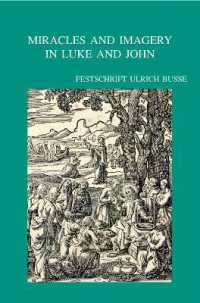- ホーム
- > 洋書
- > ドイツ書
- > Humanities, Arts & Music
- > Religion & Theology
- > christianity
Full Description
This volume collects 20 essays on Paul's theology, three appear here for the first time in English. Angela Standhartinger argues that one should read Paul's letters in their concrete social contexts of origin and reception. Paul was a Jewish wisdom theologian and apocalyptic thinker, took part in the political and philosophical discourse of his time and shared the political democratic practice of the Hellenistic ekklesia . In Part 1 the author explores how prison shapes letter writing, arguing Paul's letter to the Philippians was edited as a martyr's farewell in the 2nd century CE. In Part 2 she examines political, wisdom, and apocalyptic traditions in Phil 2:6-11 and Phil 3:2-21, and highlights the letter's theology and ethics. In Parts 3-4 Standhartinger studies early Philippian Christianity and offers feminist and anti-anti-Judaic readings of other famous pericopes of Paul's letters.








